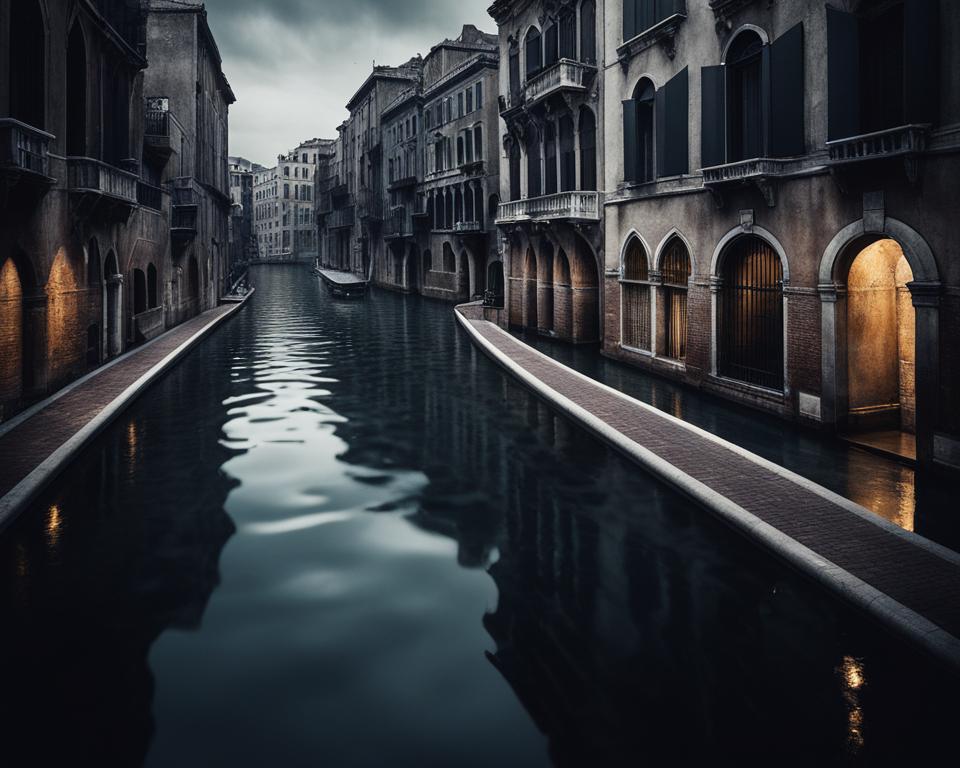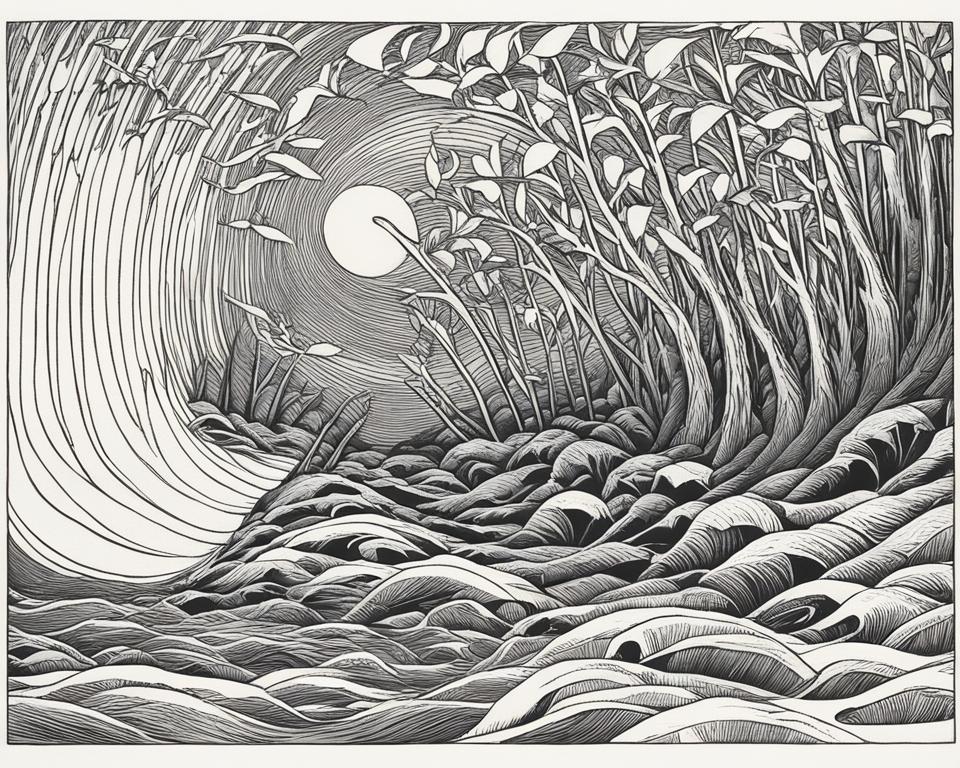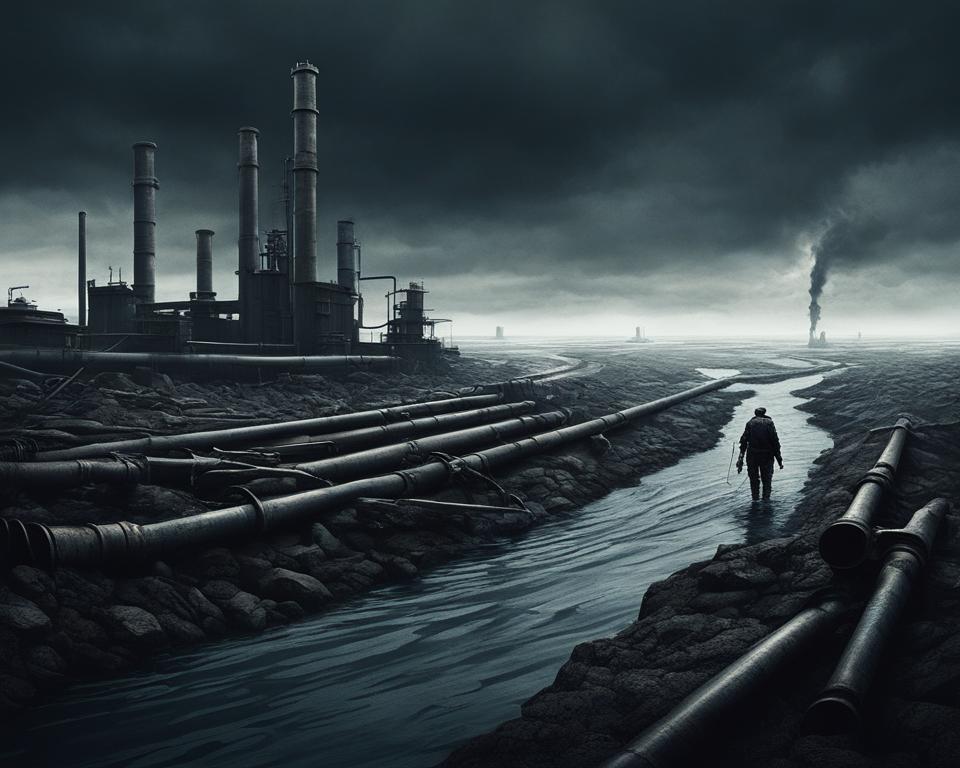If you’re a fan of gritty dystopian tales, then “The Water Knife” by Paolo Bacigalupi is likely to be right up your alley. This thrilling novel explores a future where water is the most precious commodity, and those who control it hold all the power. But how does this story translate to the audiobook format? In this review, we’ll take a closer look at the audiobook version of “The Water Knife” and evaluate its strengths and weaknesses.
Key Takeaways:
- “The Water Knife” by Paolo Bacigalupi is a gripping tale of water scarcity and power struggles in a dystopian future.
- The audiobook format of “The Water Knife” offers a unique listening experience, with quality narration and pacing.
- This audiobook explores themes such as environmental degradation, social inequality, and the quest for power.
- The characters in “The Water Knife” are well-developed and add complexity to the story.
- Overall, “The Water Knife” is a recommended listen for fans of dystopian fiction.
Introduction to “The Water Knife”
“The Water Knife” is a dystopian tale written by Paolo Bacigalupi. This novel was first published in 2015 and has since become a critically acclaimed work of fiction. Bacigalupi is a renowned writer of science fiction and fantasy novels, who has won several awards for his work.
“The Water Knife” is a unique take on the dystopian genre, focusing on the scarcity of water resources in a future American Southwest. Bacigalupi’s writing style is characterized by vivid descriptions, complex characters, and thrilling plot twists. His narrative technique is designed to keep the readers on edge throughout the novel, making this a true page-turner.
In this book, Bacigalupi has successfully created a chilling vision of the future, where water has become a valuable commodity. The story is set in a world where the struggle for water resources has led to social unrest, political violence, and widespread corruption. Bacigalupi’s ability to explore complex themes, such as environmental degradation and social inequality, makes this novel a must-read for fans of dystopian literature.
Plot Overview
“The Water Knife” audiobook version is a thrilling and suspenseful tale that takes place in a near-future America where water scarcity has become a predominant issue. The story revolves around the conflict between three major states, Nevada, Arizona, and California, who are all fighting over the limited water resources of the Colorado River.
At the center of the story is Angel Velasquez, who works as a ‘water knife’, a specialist hired to secure water rights for his employers. As Angel navigates the complex web of political intrigue and corporate interests, he uncovers a sinister plot that threatens the lives of millions.
With the help of journalist Lucy Monroe and refugee Maria Villarosa, Angel finds himself embroiled in a dangerous game of cat and mouse that spirals towards a dramatic and harrowing conclusion. Along the way, he must confront his own moral compass and make choices that will determine the fate of those around him.
The plot is full of unexpected twists and turns, keeping listeners hooked and eagerly anticipating the next chapter. From its gripping opening scene to its heart-pounding finale, “The Water Knife” audiobook version delivers a thrilling narrative that explores the consequences of environmental degradation and human greed.
Themes Explored
In “The Water Knife” by Paolo Bacigalupi, several themes are explored throughout the narrative. One of the main themes is environmental degradation, which is depicted through the scarcity of water and the devastating effects of climate change. The book also tackles issues of social inequality, as those who have access to water hold power over those who do not. This creates a system of oppression that the characters must navigate to survive.
Furthermore, “The Water Knife” delves into the theme of the pursuit of power, as the characters engage in cutthroat tactics to gain control over water resources. This obsession with power leads to corruption, violence, and a moral ambiguity that is central to the story.
Overall, the themes explored in “The Water Knife” serve to highlight the harsh realities of a world plagued by environmental crisis and social injustice. Through his narrative, Bacigalupi raises important questions about humanity’s relationship with the natural world and the consequences of turning a blind eye to the issues around us.
Character Analysis
One of the strengths of “The Water Knife” audiobook is its well-developed and multi-dimensional characters. Each main character is memorable in their own right, with their own motivations, strengths, weaknesses, and internal conflicts that drive the story forward.
Angel Velasquez, a “water knife” for the city of Las Vegas, is a complex character whose shifting loyalties and pragmatism make him both admirable and questionable. Meanwhile, Lucy Monroe, a journalist investigating water disputes, is determined and resourceful, but also vulnerable and haunted by her past.
Finally, Maria Villarosa, a refugee from Texas, is passionate and resilient, with a fierce determination to protect her family and her community from harm. These and other supporting characters come to life through the skilled narration of the audiobook performers, adding depth and nuance to the already well-crafted story.
Overall, the characterizations in “The Water Knife” audiobook are one of the book’s greatest strengths, providing a level of emotional investment and complexity that makes the story all the more compelling.
Audiobook Narration
One of the most significant aspects of the audiobook version of “The Water Knife” is its narration. The voice acting is top-notch, with each character’s personality distinctively portrayed through tone, pitch, and inflection. The pacing is smooth and even, ensuring that the story is easy to follow without sacrificing the tension and excitement of the plot.
The narrator’s delivery is engaging and immersive, drawing listeners into the dystopian world of the story. The use of accents and regional dialects adds an extra layer of authenticity to the characters and their surroundings. Overall, the audiobook version of “The Water Knife” is a masterful example of voice acting and narration, ensuring that listeners will be captivated from beginning to end.

Pacing and Engagement
“The Water Knife” is a fast-paced dystopian thriller that keeps readers on the edge of their seats. The audiobook format adds another layer of excitement, thanks to the skilled voice acting and expert pacing. From the very first chapter, listeners are drawn into a world of water scarcity, corruption, and violence, with each twist and turn building towards a thrilling climax that leaves a lasting impact.
The pacing of “The Water Knife” is superb, with just the right amount of exposition, action, and character development to keep readers engaged without overwhelming them. The story never lags or becomes predictable, but instead maintains a sense of tension and intrigue throughout. As a result, listeners are fully invested in the characters and their struggles, eager to find out what happens next.
Overall, “The Water Knife” is a masterclass in pacing, proving that even in a complex dystopian setting, it’s possible to keep readers engaged from start to finish. With its gripping storyline, memorable characters, and expert narration, this audiobook is a must-listen for fans of the genre.
World-Building
In “The Water Knife,” author Paolo Bacigalupi creates a vivid and gritty dystopian setting, characterized by rampant water scarcity, political corruption, and social decay. Through meticulous world-building, Bacigalupi paints a compelling and immersive backdrop for his characters to inhabit, giving readers a visceral sense of the desperation and struggle faced by those living in this harsh and unforgiving world.
Throughout the book, Bacigalupi weaves together various elements of his dystopian setting, from the sprawling megacities of the southwest to the lawless borderlands between them. He incorporates hints of real-world politics and environmental issues, such as the ongoing water crisis in California and the impact of climate change on vulnerable communities. By grounding his world in this reality, Bacigalupi brings a sense of urgency and immediacy to his storytelling, making it all the more compelling.
One particularly impressive aspect of the world-building in “The Water Knife” is the attention to detail and consistency. From the slang used by characters to the brands of clothing and technology they use, Bacigalupi creates a cohesive and believable universe. This level of realism adds to the immersive quality of the book, drawing readers deeper into the story and cementing its impact.
In conclusion, “The Water Knife” is a masterful testament to the power of world-building in dystopian fiction. Through his vivid and realistic portrayal of a world on the brink of collapse, Paolo Bacigalupi creates a story that is as thrilling as it is thought-provoking.
Writing Style
Paolo Bacigalupi’s writing style in “The Water Knife” is raw and gritty, captivating readers from the very first page. His use of language is descriptive and immersive, transporting readers to a dystopian future where water scarcity is the norm. Bacigalupi’s ability to create a vivid and realistic world is a testament to his talent as a writer, and it is no surprise that “The Water Knife” has garnered critical acclaim.
One of the key elements of Bacigalupi’s narrative technique is his use of dialogue. His characters are often flawed, but their conversations are authentic and poignant, providing insights into their motivations and desires. The interplay between the characters is masterfully crafted, and it adds another layer of depth to the story.
Bacigalupi’s descriptive imagery is another standout feature of his writing style. From the sweltering heat of the desert to the grimy canals of dried-up waterways, his descriptions are visceral and evocative, painting a vivid picture of the world he has created.
All in all, Bacigalupi’s writing style in “The Water Knife” is a tour de force. It is a masterclass in storytelling, and one that will leave readers thoroughly impressed.
Critical Reception
“The Water Knife” has received critical acclaim since its release, with many readers and literary critics praising the book’s powerful storytelling, vivid world-building, and thought-provoking themes. The New York Times Book Review called it a “suspenseful tale of intrigue and conspiracy” that “captures the brutal essence of the Western water crisis.”
Similarly, The Guardian noted that “Paolo Bacigalupi’s novel seethes with documentary dread,” and compared its themes to those of Cormac McCarthy’s “The Road” and Margaret Atwood’s “The Year of the Flood.”
However, some reviews also criticized the book’s pacing and characterization, with Publishers Weekly stating that “the ending feels a bit rushed” and “the characters are not as fully fleshed out as they could be.” Despite these criticisms, “The Water Knife” remains a powerful and thought-provoking work that will leave readers thinking long after they finish it.
Comparison to Other Works by Paolo Bacigalupi
In comparison to other works by Paolo Bacigalupi, “The Water Knife” follows a similar dystopian theme prevalent in most of his stories. However, it stands out for its focus on the scarcity of water and its consequences on society, a unique angle that sets it apart from other works.
Bacigalupi’s writing style is consistent throughout his books with a focus on compelling characters and intricate world-building. However, “The Water Knife” showcases particularly strong writing with vivid descriptions and a gripping plot.
Readers who enjoyed “The Water Knife” may also want to explore Bacigalupi’s other works, such as “Ship Breaker,” “The Drowned Cities,” and “The Windup Girl,” which are also characterized by their dystopian settings, complex characters, and societal themes.

Impact and Cultural Relevance
The impact of “The Water Knife” is palpable, as it explores the critical issue of environmental degradation and water scarcity. The book resonates with readers, highlighting the dire consequences of our continued neglect of these critical issues. Bacigalupi’s depiction of a dystopian society serves as a cautionary tale, urging readers to take action and create a more sustainable world.
The cultural relevance of “The Water Knife” cannot be overstated. In a world where political instability and environmental disasters are becoming increasingly prevalent, the book offers a sobering portrayal of a society on the brink of collapse. As such, it can contribute to larger discussions on issues such as climate change, social inequality, and the pursuit of power.
The title has received critical acclaim for its stark portrayal of a bleak future, and its exploration of complex themes. It serves as a reminder of our responsibility to protect the environment and preserve our natural resources for future generations. “The Water Knife” is a book that highlights the impact of human actions on the environment and underscores the urgent need for responsible management of natural resources.
Overall, “The Water Knife” is a thought-provoking and impactful book that has the potential to inspire change and spark important conversations. Its cultural relevance cannot be ignored, as it remains a poignant reminder of the urgent need to address environmental degradation and water scarcity.
Recommendations
If you enjoyed “The Water Knife” and are looking for similar books, here are some recommendations:
- The Windup Girl by Paolo Bacigalupi – This award-winning novel is set in a future where fossil fuels have been exhausted, genetic engineering reigns supreme, and political tensions are high. It explores themes of power, exploitation, and survival.
- Borne by Jeff Vandermeer – This post-apocalyptic tale takes place in a world where biotech run amok has created genetically-engineered creatures, including a mysterious and powerful creature named Borne. The novel explores themes of identity, love, and the impact of technology on humanity.
- The Water Will Come by Jeff Goodell – This nonfiction account explores the very real threat of rising sea levels and its potential impact on coastal cities around the world. It covers the science behind climate change, the political and economic challenges of adapting to rising oceans, and the human stories behind the statistics.
These titles may appeal to fans of Paolo Bacigalupi’s work, as they share similar themes of environmental degradation, social inequality, and the consequences of greed and power.
Impact of the Audiobook Format
The audiobook format of The Water Knife provides a unique listening experience for fans of dystopian fiction and Paolo Bacigalupi’s writing. While reading the book in print or digital format allows for full immersion in the text and the ability to go back and reread passages, the audiobook version adds a layer of auditory immersion that can enhance the storytelling.
With the audiobook version, readers can listen to the story while engaging in other activities, such as driving, exercising, or relaxing at home. This flexibility is a significant advantage for those with busy schedules who may not have the time to sit down and read for extended periods.
On the other hand, the audiobook format may have limitations in terms of visual details and the reader’s ability to imagine the characters and settings in their own way. The narrator’s interpretation of the characters’ voices and the pacing of the story may not align with the reader’s preferences, potentially impacting the overall enjoyment of the book.
Nevertheless, the audiobook format of The Water Knife offers a distinct listening experience that can be tailored to individual preferences. Whether reading the book in print, digital, or audiobook form, Bacigalupi’s captivating narrative and expert world-building skills will undoubtedly engage and entertain readers.
Discussion and Analysis
Now that we’ve explored various aspects of “The Water Knife” audiobook, it’s time for a deeper discussion and analysis. How did the themes of social inequality and environmental destruction resonate with you? Did the characters’ actions and motivations feel realistic and compelling? Were there any plot twists or developments that surprised you?
One interesting aspect of this book is its exploration of power dynamics and the lengths people will go to maintain control. Do you see any parallels between the world of the book and our own society? How do you think the author’s portrayal of water scarcity and resource depletion reflects broader issues facing our planet?
Another point worth considering is how the audiobook format affected your experience of the story. Did the voice acting add to the immersion and suspense, or did it detract from your ability to engage with the text? How did the pacing and structure of the audiobook compare to other audiobooks you’ve listened to?
Feel free to share your own thoughts, questions, and insights about “The Water Knife.” This is a great opportunity to engage in a broader conversation about the book and its impact, both artistic and cultural.
Conclusion
Overall, “The Water Knife” by Paolo Bacigalupi is a gripping and thought-provoking dystopian tale that is well worth experiencing in the audiobook format. The story’s twists and turns, themes of water scarcity and social inequality, and vivid world-building make for an engaging listening experience.
The writing style and narration of the audiobook are also commendable, with strong voice acting and pacing that keep the listener invested from start to finish. While some readers may find the pacing too slow or the characters too morally ambiguous, these elements ultimately contribute to the book’s overall impact and relevance.
If you enjoy dystopian stories that explore timely social and environmental issues, “The Water Knife” is a must-read (or must-listen). Its impact on the cultural conversation is undeniable, and its themes and storytelling techniques are in line with Paolo Bacigalupi’s other works.
For those looking for similar books, “The Windup Girl” by Bacigalupi and “The Hunger Games” by Suzanne Collins are good options. For those who appreciate the audiobook format, other notable titles include “The Testaments” by Margaret Atwood and “Dune” by Frank Herbert.
In closing, “The Water Knife” audiobook is a worthy addition to any book lover’s collection, offering a compelling and thought-provoking listening experience that is sure to leave a lasting impact.
FAQ
What is “The Water Knife” by Paolo Bacigalupi?
“The Water Knife” is a dystopian tale written by Paolo Bacigalupi. It explores a gritty future where water scarcity, environmental degradation, and social inequality are rampant.
Who is the author of “The Water Knife”?
“The Water Knife” is written by Paolo Bacigalupi.
What is the plot of “The Water Knife”?
“The Water Knife” revolves around the struggles for water in a dystopian future. It follows the intertwining stories of various characters as they navigate a world on the brink of collapse.
What themes are explored in “The Water Knife”?
“The Water Knife” delves into themes of environmental degradation, water scarcity, social inequality, and the pursuit of power.
Who are the main characters in “The Water Knife”?
The main characters in “The Water Knife” include Angel Velasquez, Maria Villarosa, and Lucy Monroe, each with their own motivations and conflicts.
How is the narration in the audiobook version of “The Water Knife”?
The narration in the audiobook version of “The Water Knife” is skillfully done, with engaging voice acting that brings the story to life.
What is the pacing like in “The Water Knife”?
“The Water Knife” maintains a gripping pace throughout the story, keeping readers engaged and immersed in the world created by Paolo Bacigalupi.
How is the world-building in “The Water Knife”?
The world-building in “The Water Knife” is intricately crafted, offering a detailed and realistic portrayal of a dystopian future where water is a scarce resource.
How would you describe Paolo Bacigalupi’s writing style in “The Water Knife”?
Paolo Bacigalupi’s writing style in “The Water Knife” is powerful and descriptive, using vivid language and imagery to convey the story’s themes and atmosphere.
What has been the critical reception of “The Water Knife”?
“The Water Knife” has received mostly positive reviews from both readers and literary critics, praising its thought-provoking themes and immersive storytelling.
How does “The Water Knife” compare to other works by Paolo Bacigalupi?
“The Water Knife” shares similarities with other works by Paolo Bacigalupi in its exploration of environmental and societal issues, but it also stands out as a unique and powerful story in its own right.
What is the cultural relevance of “The Water Knife”?
“The Water Knife” holds cultural relevance by addressing real-world concerns such as environmental degradation and social inequality, sparking conversations and reflections on contemporary issues.
Can you recommend other books similar to “The Water Knife”?
If you enjoyed “The Water Knife,” you might also enjoy reading other dystopian novels like “Station Eleven” by Emily St. John Mandel or “The Road” by Cormac McCarthy.
How does the audiobook format impact the reading experience of “The Water Knife”?
The audiobook format adds an immersive element to the reading experience of “The Water Knife,” allowing listeners to engage with the story through skillful narration and voice acting.
Is there a space for discussion and analysis of “The Water Knife”?
Yes, the discussion and analysis section provides readers with an opportunity to delve deeper into the themes and narrative of “The Water Knife” and engage in thoughtful conversations about the book.
How does the audiobook review of “The Water Knife” conclude?
The audiobook review of “The Water Knife” concludes by summarizing the main points discussed throughout the article, providing a final assessment of its strengths and weaknesses, and offering a closing thought on its overall worthiness.



